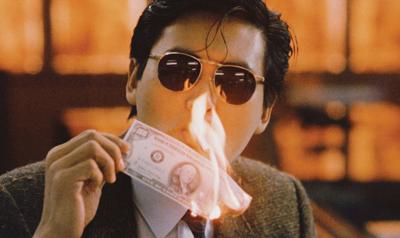Seeing John Woo’s legendary Hong Kong films again in 4K is a jarring experience.
Back in the good ol’ days of VCRs and video-store rentals, signature Woo movies such as The Killer and Hard Boiled came to these parts bruised and beaten. The victims of shoddy film-to-video transfers (this was back when mob-controlled video piracy was running wild in Hong Kong), Woo’s films, like so many Asian action films of that era, came to the States already looking like they’d been bootlegged to hell. Even when Killer and Boiled were picked up by The Criterion Collection for LaserDisc and, later, DVD release, the visual murkiness remained.
Now that we live in a world of digital restorations, these films and others from the Golden Princess Film Production catalog — dubbed Hong Kong Cinema Classics — have finally received glossy, gleaming makeovers thanks to Shout! Studios. These films are now making the rounds at repertory theaters (like the Belcourt, which will screen these films Oct. 3 through 16) and streaming platforms (The Criterion Channel will play those films and other Hong Kong imports this month).
Golden Princess (not to be confused with Golden Harvest, the studio that distributed most of Jackie Chan’s films) specialized in films with action sequences that are bloody, bombastic and — believe it or not — quite balletic. Woo’s 1986 hit A Better Tomorrow, with Ti Lung and the late Leslie Cheung as brothers on opposite sides of the law, set the tone, indulging in the same slow-motion carnage that made Sam Peckinpah’s bloodiest Westerns look artfully violent and launching the heroic bloodshed/gun-fu era of Hong Kong films. Woo would return to the hero/antihero team-up formula again with Killer and Boiled, this time making Tomorrow co-star Chow Yun-fat the charismatic lead badass.
For all the bullets, explosions and general mayhem that flowed out of these films, the best Golden Princess films are about brotherhood. Whether the protagonists are cops or criminals, they usually live by a code of honor, being there for their fellow man when things get really messy. When they’re betrayed by someone they trust, it’s more heartbreaking than being left by a girl. (With the exception of the woman-led comedy Peking Opera Blues, women are basically supporting characters in these stories.) While some may view this form of storytelling as homoerotic, this type of naked male vulnerability is something you still don’t get in stateside action films.
For old, washed cinephiles like myself, these films take us back to that wonderful, all-too-brief time in the mid- to late ’90s when it seemed like Hong Kong filmmakers and movie stars were going to inject some much-needed new blood into American action cinema. As brolic blockbusters starring Hollywood heavyweights (Schwarzenegger, Stallone, Willis, et al.) were becoming tiresome for audiences, Hollywood looked to the East, re-releasing Jackie Chan’s physically dazzling work, getting photogenic warriors like Jet Li and Michelle Yeoh to breathe new life into stale franchises and, of course, hiring Golden Princess directors to helm projects. (Woo, along with directors Tsui Hark and the late Ringo Lam, were the company’s resident agents of chaos.) Perhaps the smartest thing fellow muscle man Jean-Claude Van Damme ever did: He was the first American star to enlist Woo, Hark and Lam to direct several of his ’90s movies.
Sadly, it didn’t last long. Even though Woo gave us one of the best action films of the Clinton era with the amazingly batshit John Travolta/Nicolas Cage flick Face/Off, Tinseltown never gave him the freedom to be that gonzo again. Chow, who could blow baddies away while still looking dapper and charismatic as hell, seemed poised for movie stardom in America. Unfortunately, some of the vehicles he was saddled with — anybody remember The Replacement Killers? — were hollow retreads of the exemplary work he did with Woo.
Although it closed its doors in 1995, Golden Princess not only made icons out of its stars and filmmakers, but also influenced a lot of movies in the States. Quentin Tarantino, the world’s most famous former video store employee, basically took Lam’s 1987 crime story City on Fire (also starring Chow) and remade it as his 1992 feature debut Reservoir Dogs.
Echoes of the vivid video violence of the Golden Princess films can be found in everything from the Matrix movies to recent Oscar winner Everything Everywhere All at Once. Now action geeks young and old will finally get the chance to see these Blockbuster Video faves in a new, less-downgraded light.





